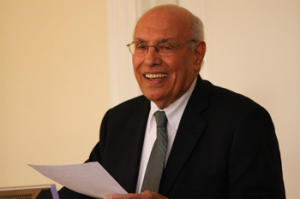Fulbright scholar and Trenton State alumnus Yassin El-Ayouty returned to the College to speak to students on Monday, Sept. 16, the anniversary of his arrival on campus from Egypt 61 years ago.
El-Ayouty, a true Renaissance man, has served many notable positions in the U. N. over three decades and founded SUNSGLOW, a private corporation that specializes in legal and judicial training in developing nations. He is a member of many bar associations within the United States and Egypt, and, as an expert in international law, has taught political science and law at various universities in both countries.
But before his successful career, El-Ayouty was a 24-year-old student of primary education and psychology at Trenton State College, which transformed his life.
“I would not be where I am now without having started as a Fulbright,” El-Ayouty said. “I would not have done the things that are good enough to mention without my (fulfilling) the Fulbright tradition of action.”
Upon arriving on campus in 1952, El-Ayouty met with William H. Hausdoerffer, the dean of men at the time, and Hausdoerffer’s wife, Rosemary, in Bliss Hall, which had been used as a dormitory. Rosemary gave the famished El-Ayouty a glass of milk — “the most delicious glass of milk (he’d) ever had.”
Hausdoerffer became a mentor to El-Ayouty throughout his stay at the College. Within the next few weeks, Hausdoerffer brought El-Ayouty to meet Dwight D. Eisenhower, who was campaigning for president, and later, Harry S Truman.

“Hausdoerffer said, ‘You want to meet Truman?’ I said, ‘The president of the United States? Yes!’” El-Ayouty said.
Among other Trenton State faculty whom El-Ayouty remembered fondly were English professor Alfred P. Holman and former president Roscoe West, after whom Holman Hall and the Roscoe L. West Library are named.
“All of these people were really the basic plaster of my interacting with the College,” El-Ayouty said.
While in the United States, El-Ayouty ran into financial troubles because he was unable to access the money that his father had allocated to him in Egypt. Hausdoerffer assisted El-Ayouty by finding him part-time jobs. El-Ayouty was assigned the job of fixing a storm window in a faculty member’s home. When he had finished, one of the ladies in the house invited him up for tea and cookies and asked him about the Egypt Revolution of 1952.
“I told them about the Egypt Revolution and by the time I was done, each one of them had an envelope with $5 in it,” El-Ayouty said. “I felt like Donald Trump.”
Another job that Hausdoerffer found for El-Ayouty was babysitting for two young children in the neighborhood. As soon as the parents left for their dinner dance, El-Ayouty was met with the challenge of entertaining the children for the night.
“In Egypt, I used to write children’s literature, so each story has a moral in it: either generosity, or doing good work, or serving your community, but it has to kind of be put in an imaginary setting,” El-Ayouty said. “So I said, ‘Have you heard about the big Indian chief?’ (The children) said, ‘No, no, no,’ and immediately sat on the carpet floor. Then I started saying it from imagination, and it just came to me easy. I was enjoying my own imagination.”
The next day, Hausdoerffer approached El-Ayouty and asked for his secret. Parents all over the neighborhood were interested in El-Ayouty’s babysitting services.
“At this time, I was American enough to turn a good deed into a mass production,” El-Ayouty said. “I said ‘OK,’ I would suggest, if it works and it’s legal, I suggest that all of these kids that want me would gather twice a week in the house of one of them for three hours. And so it went. You know, it was a beautiful experience.”
El-Ayouty also enjoyed a fulfilling social life while at the College. Many students invited him over to their houses for dinner or the holidays. At times, his friends even brought him to church. There are a couple of friends with whom he still stays in contact with today.
El-Ayouty also joined a fraternity, Theta Nu Sigma.
“It was great,” El-Ayouty said. “It had various social events, and at the end of the school year, the father of one of them owned a great Italian restaurant, and we had spaghetti and meatballs. Everything was simple. Everything was direct. Everything was warm.”
Overall, El-Ayouty remembers feeling very welcome at the College, even on his graduating day.
“When the students stood on the steps before the Library before graduation, it was a tradition (that) they sing together,” El-Ayouty said. “They included in one of the verses about me. All of this made me feel very attached, completely attached to the College.”






